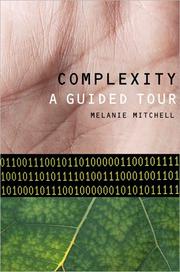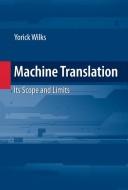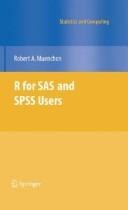| Listing 1 - 8 of 8 |
Sort by
|
Dissertation
ISBN: 9789460181146 Year: 2009 Publisher: Leuven Katholieke Universiteit Leuven
Abstract | Keywords | Export | Availability | Bookmark
 Loading...
Loading...Choose an application
- Reference Manager
- EndNote
- RefWorks (Direct export to RefWorks)
Automatisch leren (''machine learning'') is het onderzoeksveld binnen kunstmatige intelligentie dat zich bezig houdt met het ontwikkelen van computer programma's die kunnen leren uit ervaring. Een belangrijke toepassing hiervan is het leren uit beloningen (''reinforcement learning'' (RL)) waarbij de programma's dienen te leren door middel van interactie met hun omgeving en dit op basis van beloningen of straffen die zij ontvangen als informatie over hun vertoonde gedrag, d.w.z. positieve of negatieve numerieke waarden. Om dergelijke technieken toe te passen in complexe omgevingen is er veel onderzoek gedaan naar de integratie van allerlei vormen van abstractie en generalisatie in deze leertechniek. E'en van deze vormen, dewelke recent veel interesse geniet, is het gebruik maken van relationele representaties bij het voorstellen van toestanden, acties en het gedrag van het systeem. In dit proefschrift zullen we technieken onderzoeken die verder bouwen op deze vorm van abstractie en dan met name systemen ontwikkelen die extra informatie over de omgeving kunnen leren en deze informatie vervolgens gebruiken om sneller een goed gedrag te leren. In een eerste deel zullen we drie zulke systemen voorstellen. Een eerste systeem combineert relationele representaties en temporele abstractie. Vervolgens zullen we een model-gebaseerd leersysteem voorstellen dat de dynamica van de omgeving kan leren. Het derde leersysteem onderzoekt de invloed van meerdere leersystemen in dezelfde omgeving. We zullen hierbij aantonen hoe relationele representaties gebruikt kunnen worden om de leersystemen van elkaar te laten leren en hoe deze tevens kunnen helpen bij de communicatie tussen deze verschillende systemen. In een tweede deel zullen twee technieken voorgesteld worden die betere modellen kunnen leren. Een eerste techniek is een nieuwe leermethode voor het incrementeel leren van relationele regressie bomen en een tweede techniek die probabilistisch logische modellen kan leren.
681.3 <043> --- Academic collection --- Computerwetenschap--Dissertaties --- Theses
Book
ISBN: 9783412203498 3412203491 Year: 2009 Volume: 12 Publisher: Köln: Böhlau,
Abstract | Keywords | Export | Availability | Bookmark
 Loading...
Loading...Choose an application
- Reference Manager
- EndNote
- RefWorks (Direct export to RefWorks)
Book
ISBN: 9789090233406 Year: 2009 Publisher: Amsterdam Reinwardt Academie
Abstract | Keywords | Export | Availability | Bookmark
 Loading...
Loading...Choose an application
- Reference Manager
- EndNote
- RefWorks (Direct export to RefWorks)
Museology --- Information systems --- 930.25:681.3 --- 930.25 <492> --- 930.25 <492> Archiefwetenschap. Archivistiek--Nederland --- Archiefwetenschap. Archivistiek--Nederland --- 930.25:681.3 Archiefwetenschap. Archivistiek-:-Computerwetenschap --- Archiefwetenschap. Archivistiek-:-Computerwetenschap
Book
ISBN: 9783642028458 3642028454 9786612297915 1282297910 3642028462 Year: 2009 Publisher: Berlin Springer
Abstract | Keywords | Export | Availability | Bookmark
 Loading...
Loading...Choose an application
- Reference Manager
- EndNote
- RefWorks (Direct export to RefWorks)
681.3*D16 --- 681.3*I23 <063> --- 681.3*D16 Computer science--?*D16 --- 681.3*D16 Computerwetenschap--?*D16 --- Computer science--?*D16 --- Computerwetenschap--?*D16 --- 681.3*I23 <063> Deduction and theorem proving: answer/reason extraction; reasoning; resolution; metatheory; mathematical induction; logic programming (Artificial intelligence)--Congressen --- Deduction and theorem proving: answer/reason extraction; reasoning; resolution; metatheory; mathematical induction; logic programming (Artificial intelligence)--Congressen --- Conferences - Meetings

ISBN: 1282328239 9786612328237 0199724571 9780199724574 9780195124415 0195124413 9780199798100 0197700608 9781282328235 6612328231 9780199741021 0199741026 Year: 2009 Publisher: Oxford: Oxford university press,
Abstract | Keywords | Export | Availability | Bookmark
 Loading...
Loading...Choose an application
- Reference Manager
- EndNote
- RefWorks (Direct export to RefWorks)
This text provides an intimate, highly readable tour of the sciences of complexity, which seek to explain how large-scale complex, organized, and adaptive behaviour can emerge from simple interactions among myriad individuals.
Complexity (Philosophy) --- Philosophy --- Emergence (Philosophy) --- 51 --- complexiteit --- complexiteitstheorie --- computers --- 681.3*2.13 --- 681.3*F2 --- Computerwetenschap--?*2.13 --- Analysis of algorithms and problem complexity --- Complexité (Philosophie) --- Mathematical statistics --- Philosophy of science --- Complexity (Philosophy).

ISBN: 9780387727745 9780387727738 0387727736 Year: 2009 Publisher: Boston, Mass.: Springer,
Abstract | Keywords | Export | Availability | Bookmark
 Loading...
Loading...Choose an application
- Reference Manager
- EndNote
- RefWorks (Direct export to RefWorks)
Machine Translation is the author's comprehensive view of machine translation (MT) from the perspective of a participant in its history and development. The text considers MT as a fundamental part of Artificial Intelligence and the ultimate test-bed for all computational linguistics, covering historical and contemporary systems in Europe, the US and Japan. The author describes and contrasts a range of approaches to MT's challenges and problems, and shows the evolution of conflicting approaches to MT towards some kind of skeptical consensus on future progress. The volume includes historic papers, updated with commentaries detailing their significance both at the time of their writing and now. The book concludes with a discussion of the most recent developments in the field and prospects for the future, which have been much changed by the arrival of the World Wide Web. Anyone interested in the progress of science and technology, particularly computer scientists and students, will find this a fascinating exploration of MT technology. Yorick Wilks is a Professor of Computer Science at the University of Sheffield, where he directs the Institute for Language, Speech and Hearing. He received his M.A. and Ph.D. (1968) from Pembroke College, Cambridge. He has also taught or researched at Stanford, Edinburgh, Geneva, Essex and New Mexico State Universities. His interests are artificial intelligence and the computer processing of language, knowledge and belief. He is a Fellow of the European and American Societies for Artificial Intelligence, a Fellow of the EPSRC College of Computing and a member of the UK Computing Research Council. Wilks was awarded the Antonio Zampolli prize by the European Language Resources Association in 2008. This prize is given to individuals whose work lies within the areas of Language Resources and Language Technology Evaluation with acknowledged contributions to their advancements. He was also the recipient of an ACL Life Achievement Award at the 46th Annual Meeting of the Association for Computational Linguistics in 2008.
Linguistics --- informatietechnologie --- Translation science --- Computer. Automation --- robots --- computergeschiedenis --- Information systems --- Operational research. Game theory --- IR (information retrieval) --- Artificial intelligence. Robotics. Simulation. Graphics --- vertalen --- linguïstiek --- stochastische analyse --- 800 --- 681.3* / / / / / / / / / / / / / / / / / / / / / / / / / / / / --- 800 Taalwetenschap. Taalkunde. Linguistiek --- Taalwetenschap. Taalkunde. Linguistiek --- Computerwetenschap --- Computer Science --- Information storage and retrieval systems --- Artificial intelligence --- Translators (Computer programs)
Book
ISBN: 9789089641397 9789048510696 9089641394 9048510694 9048520916 9786612401985 128240198X Year: 2009 Publisher: [Amsterdam] : Amsterdam University Press,
Abstract | Keywords | Export | Availability | Bookmark
 Loading...
Loading...Choose an application
- Reference Manager
- EndNote
- RefWorks (Direct export to RefWorks)
In From Grain to Pixel, Giovanna Fossati analyzes the transition from analog to digital film and its profound effects on filmmaking and film archiving. Reflecting on the theoretical conceptualization of the medium itself, Fossati poses significant questions about the status of physical film and the practice of its archival preservation, restoration, and presentation. From Grain to Pixel attempts to bridge the fields of film archiving and academic research by addressing the discourse on film's ontology and analyzing how different interpretations of what film is affect the role and practices of film archives. By proposing a novel theorization of film archival practice, Fossati aims to stimulate a renewed dialogue between film scholars and film archivists. Almost a decade after its first publication, this revised edition covers the latest developments in the field. Besides a new general introduction, a new conclusion, and extensive updates to each chapter, a novel theoretical framework and an additional case study have been included.
Film --- Archivistics --- Archieven. --- Digital preservation. --- Film archives. --- Films. --- Motion picture film --- Preservation. --- Digital preservation --- Film archives --- 930.25:681.3 --- 930.25 --- Motion pictures --- Archives, Motion picture --- Motion picture archives --- Archives --- Motion picture film collections --- Computer files --- Digital curation --- Digital media --- Electronic preservation --- Preservation of digital information --- Preservation of materials --- 930.25 Archiefwetenschap. Archivistiek --- Archiefwetenschap. Archivistiek --- 930.25:681.3 Archiefwetenschap. Archivistiek-:-Computerwetenschap --- Archiefwetenschap. Archivistiek-:-Computerwetenschap --- Preservation --- Conservation and restoration --- Preservation and storage --- Archives cinématographiques --- Numérisation --- Films (Pellicule cinématographique) --- Conservation --- Cinemateques --- Preservació digital --- Pel·lícules cinematogràfiques (Material fotogràfic) --- Conservació --- Conservació i emmagatzematge de pel·lícules cinematogràfiques --- Conservació de documents electrònics --- Conservació de recursos electrònics --- Conservacio digital --- Conservació electrònica --- Conservació electrònica de documents --- Digitalització --- Mitjans de comunicació digitals --- Preservació d'informació digital --- Preservació electrònica --- Recursos electrònics --- Materials --- Materials d'arxiu --- Materials de biblioteca --- Arxius cinematogràfics --- Biblioteques cinematogràfiques --- Cinematografia --- Filmoteques --- Films --- Pel·lícules cinematogràfiques (Cinematografia) --- Biblioteques especialitzades --- Biblioteques i cinematografia --- Conservació i emmagatzematge --- Conservació i restauració --- Preservació --- Arxius --- Biblioteques --- Col·leccions --- digital archiving --- pixel --- motion pictures --- film

ISBN: 0387094172 9786612037504 1282037501 0387094180 3540094180 3540094172 3642813534 3642813518 9783540094173 9780387094175 Year: 2009 Volume: 9 Publisher: New York, NY : Springer New York : Imprint: Springer,
Abstract | Keywords | Export | Availability | Bookmark
 Loading...
Loading...Choose an application
- Reference Manager
- EndNote
- RefWorks (Direct export to RefWorks)
R is a powerful and free software system for data analysis and graphics, with over 1,200 add-on packages available. This book introduces R using SAS and SPSS terms with which you are already familiar. It demonstrates which of the add-on packages are most like SAS and SPSS and compares them to R's built-in functions. It steps through over 30 programs written in all three packages, comparing and contrasting the packages' differing approaches. The programs and practice datasets are available for download. The glossary defines over 50 R terms using SAS/SPSS jargon and again using R jargon. The table of contents and the index allow you to find equivalent R functions by looking up both SAS statements and SPSS commands. When finished, you will be able to import data, manage and transform it, create publication quality graphics, and perform basic statistical analyses. Robert A. Muenchen is the manager of the Statistical Consulting Center at the University of Tennessee and has 28 years of experience as a consulting statistician. He has served on the advisory boards of SPSS Inc. and the Statistical Graphics Corporation. "This is a really great book. It is easy to read, quite comprehensive, and would be extremely valuable to both regular R users and users of SAS and SPSS who wish to switch to or learn about R…An invaluable reference." - David Hitchcock, University of South Carolina "Thanks for writing R for SAS and SPSS Users--it is a comprehensible and clever document. The graphics chapter is superb!" - Tony N. Brown, Vanderbilt University "This is a Rosetta Stone for SPSS and SAS users to start learning R quickly and effectively." - Ralph O'Brien, ASA Fellow "I am a professional SAS and SPSS programmer and found this book extremely useful." - Tony Chu, Public Policy Research Data Analyst.
Image processing. --- Image restruction. --- Imaging systems in medicine. --- R (Computer program language). --- Radio astronomy. --- SAS (Computer file). --- SPSS (Computer file). --- Sun --Corona. --- Tomography. --- R (Computer program language) --- Image Enhancement --- Tomography --- Image Processing, Computer-Assisted --- Photography --- Diagnostic Imaging --- Diagnostic Techniques and Procedures --- Computing Methodologies --- Information Science --- Diagnosis --- Analytical, Diagnostic and Therapeutic Techniques and Equipment --- Mathematical Statistics --- Mathematics --- Physical Sciences & Mathematics --- SAS (Computer file) --- SPSS (Computer file) --- GNU-S (Computer program language) --- Statistical package for the social sciences --- Statistical analysis system --- SAS system --- Ferroelectric crystals. --- Photoferroelectric effect. --- Cristaux ferroélectriques --- Cristaux ferroélectriques --- Image restruction --- 681.3*J0 --- Image processing: image displays; image processing software (Computing methododologies) --- Computerwetenschap--?*J0 --- 681.3*I4 Image processing: image displays; image processing software (Computing methododologies) --- Mathematics. --- Mathematical statistics. --- Data mining. --- Computer graphics. --- Computer software. --- Statistics. --- Psychology --- Psychological measurement. --- Mathematical Software. --- Statistics and Computing/Statistics Programs. --- Probability and Statistics in Computer Science. --- Data Mining and Knowledge Discovery. --- Computer Graphics. --- Psychological Methods/Evaluation. --- Methodology. --- 681.3*A0 --- 681.3*I4 --- 681.3*I5 --- 681.3*I5 Pattern recognition (Computing methodologies) --- Pattern recognition (Computing methodologies) --- 681.3*A0 General --- General --- Domain-specific programming languages --- Radio astronomy --- Imaging systems in medicine --- Sun --- Corona --- Computer science. --- Psychological tests and testing. --- Automatic drafting --- Graphic data processing --- Graphics, Computer --- Computer art --- Graphic arts --- Electronic data processing --- Engineering graphics --- Image processing --- Algorithmic knowledge discovery --- Factual data analysis --- KDD (Information retrieval) --- Knowledge discovery in data --- Knowledge discovery in databases --- Mining, Data --- Database searching --- Informatics --- Science --- Statistical inference --- Statistics, Mathematical --- Statistics --- Probabilities --- Sampling (Statistics) --- Software, Computer --- Computer systems --- Digital techniques --- Statistical methods --- Statistics . --- Psychology—Methodology. --- Measurement, Mental --- Measurement, Psychological --- Psychological measurement --- Psychological scaling --- Psychological statistics --- Psychometry (Psychophysics) --- Scaling, Psychological --- Psychological tests --- Scaling (Social sciences) --- Statistical analysis --- Statistical data --- Statistical science --- Econometrics --- Measurement --- Scaling --- Methodology --- SAS (Logiciel) --- SPSS (Logiciel) --- Sun - Corona --- Psychometrics.
| Listing 1 - 8 of 8 |
Sort by
|

 Search
Search Feedback
Feedback About UniCat
About UniCat  Help
Help News
News